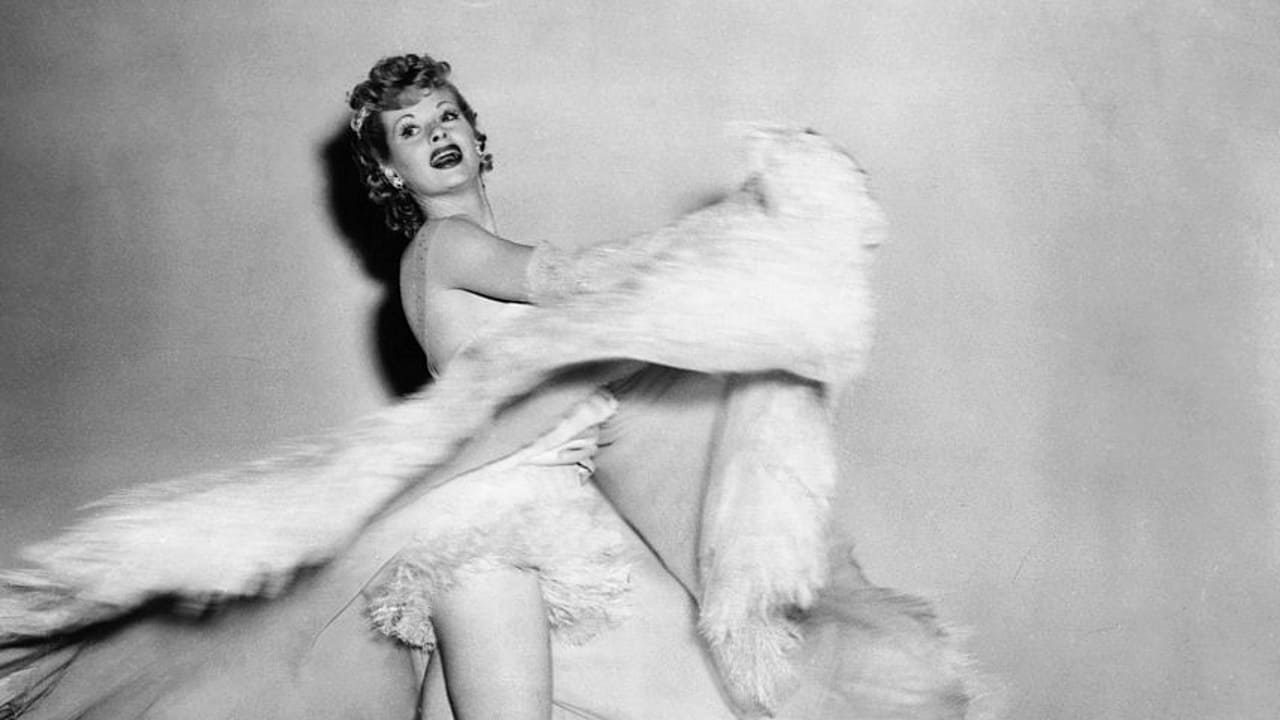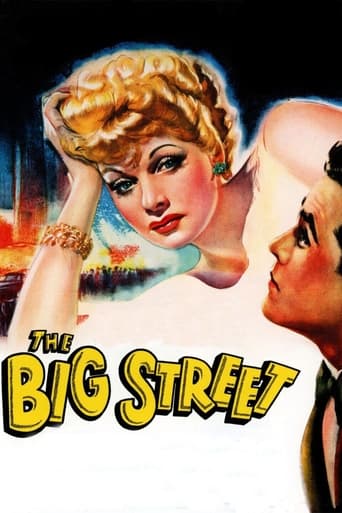

The Big Street is one of those sentimental little yarns blown up from the whimsical attractiveness of print to the harsher light of the cinema screen. It is the sort of story that Damon Runyon excels in - and here he is producing it for the screen himself! Alas, the principal pleasure in reading his stories is his very characteristic literary style - a tongue-in-cheek amalgam of East Side slang and back of Broadway jargon - that is extremely difficult to transfer to the screen without losing the bite and humor that is an essential ingredient of its flavor. One-dimensional characters which seem so amusing on the printed page are also much less appealing on the screen unless the players can achieve exactly the right balance between fancy and reality.This adaptation is only moderately successful. The direction is routine and production values are very moderate. A lot of obvious process work doesn't really help either. On the other hand, Russell Metty's lighting photography is so polished and atmospheric and the sets and costumes are so attractive as to overshadow the lack of craftsmanship in other departments. Furthermore, the cast is outstanding. True, some of the more interesting players like Eugene Pallette, Agnes Moorehead and Barton MacLane have only small parts, but Henry Fonda and Lucille Ball make a worthy team. Fonda manages to bring absolute conviction and sincerity to the incredibly naive and almost impossibly devoted Little Pinks. As for Lucille Ball, she herself and many critics regard her characterization of the willful and conceited Gloria as her finest screen performance.N.B. Similarity of the plot and principal characters to those of Midnight Cowboy (1969) should not go unnoticed. Miss Ball's singing voice was dubbed by Martha Mears.
... View MoreI actually found a lot of "The Big Street" to be a little flat: it seemed like not much happens in large portions of it. But otherwise it's an OK movie, as meek busboy Pinks (Henry Fonda) has an unrequited love for sassy singer Gloria (Lucille Ball). After Gloria's gangster boyfriend (Barton MacLane) pushes her down the stairs and paralyzes her, Pinks takes care of her, wheeling her all the way down to Florida! So while the movie has some good spots, I thought that it wasn't as interesting as it could have been. One thing that might pique people's curiosity about it is the idea that Lucille Ball (presumably in the persona of Lucy Ricardo) co-stars with Barton MacLane (Gen. Peterson on "I Dream of Jeannie") and Agnes Moorehead (Endora on "Bewitched").So, you can see "The Big Street" if you want, but it's not the movie that I would recommend above all others. A movie in which Ball was really good was the film noir "The Dark Corner".
... View MoreThe Big Street (1942)Packed with great actors, major and minor, in a fast fast whirlwindFirst of all, Agnes Moorehead and Ray Collins played the previous year in another raging movie of some fame (Citizen Kane, yup), and here they are loaded up against a dozen other great character actors, plus a couple big names. Headlining is the well known Henry Fonda, still young, but fresh off of a couple great films, Grapes of Wrath (1940), and The Young Mr. Lincoln (1939). But in a kind of startling role for those who know Lucille Ball as a brilliant and goofy t.v. comedian a decade later, we have her here as a big-eyed femme fatale, or would-be femme fatale until fate takes a turn.You might think this one is a screwball comedy the way it starts, but keep watching-- there is violence and trauma soon enough, and the movie takes a turn that Fonda is worthy of. There is a Frank Capra feel-good element amidst the hardship, but it is full of verve, and all these odd characters who really are (were and are) what New York is at its best. The director Irving Reis (with photographer Russell Metty) keeps the scenes snappy, and sometimes moves from a closeup of a face to a background quickly, to let a character make a dramatic point. There are lots of movie tricks, quick fades from scene to scene to show the passing of time, and some tacky back projection, and it really goes along with the fairy tale narrative.And there really is an unbelievable ending, which you have to take with the whole flavor of the movie, a kind of sincerity/fantasy mixture.
... View More"The Big Street" was not a major hit when first released but the critics at the time all noted Lucille Ball's superb star-making performance as one of the all-time nastiest women ever to reach the big screen. Lucy was already a minor star thanks to a string of popular B-grade comedies and dramas but this film cemented her stardom and brought her to MGM where she reached an early peak the next year. The film is sentimental and does have some plot points that have to be swallowed but Ball's great acting and chemistry with a splendid Fonda makes this tale of unrequited love work. Fonda plays a kind innocent busboy who falls madly in-love with a crippled chanteuse(Ball). The last scene on the dance floor is unforgettable. Why RKO did not get Lucy an Oscar nomination for this performance is a crime. All the critics at the time hailed her work in this but it just slipped under the rug when the film posted only small profits. This was the kind of role Bette Davis made her own but Ball does it without Davis' habit of falling into mannerisms. Agnes Moorehead is also excellent as Fonda's concerned friend. Beautiful cinematography makes Ball look incredible in her close-ups. Worth a look but overlook the occasional mawkish elements. Lucy makes it a must.
... View More